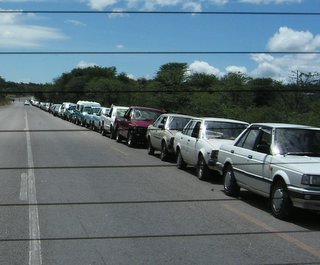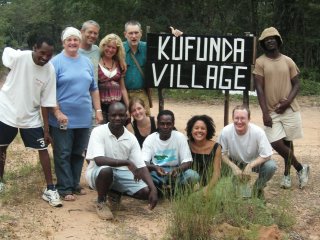"'Life' refers to the biological processes by which living things maintain themselves over time. 'Money,' to the present economic ideology which says that as long as the volume of money changing hands increases, all will be well. 'Illusion' refers to the fact that these two perspectives are directly opposed in terms of how they would solve current problems." - Mike Nickerson.
The previous article reffered to the mechanisms of our economic system, and why it is degrading our society and our environment. Here are two examples of responses to the challenges we face. The first is a personal account from a trip that I made with Kim, my life partner, to the Kufunda Learning Village in Zimbabwe early this year. The second describes Willits, California and why they are gaining worldwide respect for their efforts at localisation.
Zimbabwe is a country in crisis. The four day petrol queues are one obvious manifestation of an economy on its knees. Inflation was 740% per year, leaving the poor to fend for themselves. Now imagine 700,000 people - made homeless last year in a government mission known on the street as "The Tsunami." Bulldozers were used to clear entire shantytowns forcing people to move out into the country. Unfortunately after years of colonisation and reliance on large scale commercial farming, they have minimal tools for this new life.

Step in the Kufunda Learning Village. A group of a dozen passionate Zimbabweans working to demonstrate and teach self-reliance: Composting toilets ensure nutrients are not wasted but used to grow fruit trees. A substantial herb garden and processing room allow healing ointments and solutions to be made for their people who live with a 30% HIV infection rate. Bee hives bring offer wax for some of their ointments, and honey. A pre-school is getting a rammed earth building erected, and the teachers are taking care of the children admirably. There is a large kitchen with efficient wood-fired cooking facilities. The library boasts books on subjects ranging from food growing to geo-politics. Dwellings and meeting rooms have been made using earth bricks and local thatch. Permaculture style vegetable gardens and young fruit trees offer greater food security. And a local currency based on hours of time is being traded in their broader region.
With the environmental, social, political and economic landscapes changing ever more quickly, people everywhere are looking for ways to organise to meet our needs locally. The Kufunda community has made amazing progress over four short years, while simultaneously assisting half a dozen other communities in their country, to do likewise. The persistent feeling Kim and I shared was that we were being given a glimpse of how our society may look as cheap oil becomes a thing of the past, along with the artificial or temporary affluence it has given us. We are most grateful for their examples.

The progressive community of Willits can best be described by the projects it has begun. Due to space constraints I had to omit half of the list, some of which we are already doing on Waiheke. The City of Willits has voted “Yes”, to the building of a solar (photovoltaic) array to offset the City of Willit's electricity usage. A Vehicle Share Demonstration Project is intended to provide a model for a citizen-based transportation in which a variety of vehicles, each serving a different need, would be purchased, maintained, and shared by a number of residents. A Barn Raising Project gets people from the community to help out on projects previously submitted (by anyone in the community) - such projects could include such projects as the home repairs of an incapacitated resident. The School Gardens Project involves siting and creation of teaching gardens at the schools within the area.
Many people in the US have been inspired by their efforts at localisation and self-reliance and are engaging with others to give birth to their own localisation solutions.
---0---
Is raw capitalism the best possible outcome for our well being? Or can thousands of diverse, locally-rooted, grassroots economic projects form the basis for a viable democratic alternative to capitalism? What really sustains us when the factories shut down, when the flood waters rise, or when the paycheck is not enough? In the face of failures of market and state, we often survive by self-organized relationships of care, cooperation, and community - Dollars and Sense by Ethan Miller
The next article will look at Waiheke initiatives as we seek to find ways to respond to the challenges of this evolutionary moment. Please contact me (jms@ihug.co.nz 372 8737) and tell me about your projects.
